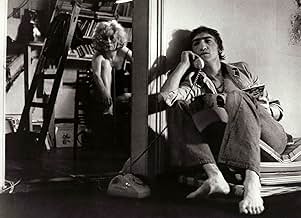NOTE IMDb
7,5/10
2,3 k
MA NOTE
Monsieur Kuster, ouvrier, tue un dirigeant de son entreprise et se suicide. Délaissée par ses enfants, sa femme affronte seule les humiliations de la presse à scandale.Monsieur Kuster, ouvrier, tue un dirigeant de son entreprise et se suicide. Délaissée par ses enfants, sa femme affronte seule les humiliations de la presse à scandale.Monsieur Kuster, ouvrier, tue un dirigeant de son entreprise et se suicide. Délaissée par ses enfants, sa femme affronte seule les humiliations de la presse à scandale.
- Récompenses
- 3 nominations au total
Adrian Hoven
- Redacteur - in - chief Linke
- (non crédité)
Histoire
Le saviez-vous
- AnecdotesFinal theatrical film of Karlheinz Böhm.
- Citations
Emma Küsters: Everybody's out for something. Once you realize that, everything is simple.
Commentaire à la une
Fassbinder's most political film, mixes all imaginable elements dominating the news in 1970s Germany. The story begins with a radio news bulletin about a factory worker going berserk, killing a supervisor, then himself. The man's lower class family (busy with small assembly "homework") engages in evening small talk, casually mentioning the news flash in their conversation. Minutes later the bad news arrives at the door.
Immediately the vulnerable "Mother Kusters" is hounded by reporters from the boulevard press. Twisting her words, as well as those of children and a pregnant daughter in-law, along with taking countless bad-angle photographs, the press has their story. The name of easy-going, kind and obedient Father Kusters is ruined.
Several characters bring definite color to this unusual story. Mother Kusters' 30-something daughter, an aspiring lounge singer (a la Marlene Dietrich) shamelessly exploits her newly gained celebrity status by initiating press interviews about her father's tragedy, then moving in with the questionable reporter, who also arranged singing work through "connections".
Mother Kusters soon is "lulled in" by some upscale and persuasive communists, who appear sympathetic, but eventually seem to be exploiting the poor old woman for their own political gains. Finally Mother Kusters ends in a bizarre trap she unwittingly fell for: A group of anarchists, under the pretense of assuring that her husband's name will be cleared, use the woman in a hostage stand-off aimed at the release of political prisoners. - The final scene suddenly stops in a freeze frame, with a brief written description of the immediate action to follow. WOW!
Although not among Fassbinder's great classics, this is an impressive film. The statements made here were originally (in the mid-70s) met with criticism. The treatment of communism and anarchy (in a not necessarily negative way) were seen as contrary to common acceptance of the day. Years after the Cold War's end, the story of "the factory murderer" seems dated. Still, a well-worth-seeing film!
Immediately the vulnerable "Mother Kusters" is hounded by reporters from the boulevard press. Twisting her words, as well as those of children and a pregnant daughter in-law, along with taking countless bad-angle photographs, the press has their story. The name of easy-going, kind and obedient Father Kusters is ruined.
Several characters bring definite color to this unusual story. Mother Kusters' 30-something daughter, an aspiring lounge singer (a la Marlene Dietrich) shamelessly exploits her newly gained celebrity status by initiating press interviews about her father's tragedy, then moving in with the questionable reporter, who also arranged singing work through "connections".
Mother Kusters soon is "lulled in" by some upscale and persuasive communists, who appear sympathetic, but eventually seem to be exploiting the poor old woman for their own political gains. Finally Mother Kusters ends in a bizarre trap she unwittingly fell for: A group of anarchists, under the pretense of assuring that her husband's name will be cleared, use the woman in a hostage stand-off aimed at the release of political prisoners. - The final scene suddenly stops in a freeze frame, with a brief written description of the immediate action to follow. WOW!
Although not among Fassbinder's great classics, this is an impressive film. The statements made here were originally (in the mid-70s) met with criticism. The treatment of communism and anarchy (in a not necessarily negative way) were seen as contrary to common acceptance of the day. Years after the Cold War's end, the story of "the factory murderer" seems dated. Still, a well-worth-seeing film!
Meilleurs choix
Connectez-vous pour évaluer et suivre la liste de favoris afin de recevoir des recommandations personnalisées
- How long is Mother Kusters Goes to Heaven?Alimenté par Alexa
Détails
Box-office
- Budget
- 750 000 DEM (estimé)
- Montant brut aux États-Unis et au Canada
- 8 144 $US
- Week-end de sortie aux États-Unis et au Canada
- 11 623 $US
- 16 févr. 2003
- Montant brut mondial
- 8 148 $US
Contribuer à cette page
Suggérer une modification ou ajouter du contenu manquant

Lacune principale
What is the English language plot outline for Maman Küsters s'en va au ciel (1975)?
Répondre
































